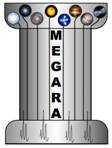Dept. Astrofísica y CC de la Atmósfera Univ. Complutense de Madrid
| Research lines:
Local star-forming galaxies Galaxy models Surveys Databases SHARDS project Stellar libraries Early-type galaxies Meteors and Fireballs Dark Skies |
Instrumental developments: MEGARA:Multi-Espectrógrafo en GTC de Alta Resolución para Astronomía |  |
| EMIR: Espectrógrafo Multiobjeto en el InfraRrojo |

| |
| FRIDA: inFrared Imager and Dissector for Adaptative optics |
 |
Barry F. Madore at UCM
Barry F. Madore scientific staff of The Observatories of the Carnegie Institutions at Washington (OCIW) gave an interesting talk on "What, if anything, is a galaxy?" which is related to one of his scientific interest: 'The complexities of deciphering galaxy evolution'.
Miguel Charcos, visiting student
Miguel Charcos is a graduate student in the Department of Astronomy at the University of Florida. Dr. Stephen Eikenberry is his thesis advisor. Miguel is now at UCM
Johannes Andersen visits UCM
We met prof. Johannes Andersen, chair of the board of ASTRONET, who gave a talk about the future of Astronomy in Europe: "Current planning initiatives for European Astronomy".
arXiv:0810.1709. Ramos-Almeida et al. New paper published by GUAIX astronomers
A new paper produced by the GUAIX astronomers has been acepted for publication. The collaboration is part of the GOYA project and uses the UCM Rainbow database to study the physical properties of AGNs in the Extended Groth Strip.
Entrevista a Armando Gil de Paz
Armando Gil de Paz, experto en astronomía extragaláctica e investigador de la UCM: “Estudiar las estrellas más masivas puede ayudarnos a entender el universo primigenio”
Armando Gil de Paz ha desarrollado su carrera investigadora a medio camino entre Estados Unidos y España. Tras trabajar en el Laboratorio de Propulsión a Chorro (JPL) de la NASA y la Institución Carnegie de Washington, y convertirse en uno de los mayores especialistas en su campo, la astronomía extragaláctica, ha podido regresar de nuevo a la Universidad Complutense de Madrid de la mano del programa Ramón y Cajal.
Lee la entrevista completa en UCM OTRI














